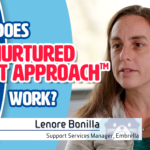When you don’t know where your next meal is coming from, it’s understandable that you would try to save every morsel. For thousands of children throughout the country, food is as fleeting as the time it takes to chew and swallow. Unfortunately, food hoarding in foster children is an all too common practice.
By human instinct, we do what we need in order to survive. It’s something that we are all born with. There are many interpretations, depending on your source of information, of what every human needs to stay alive (e.g., water, air and shelter). While they are all necessary, food is one of the basic human needs that is directly connected to our emotions.
The smell of grandma’s fresh pie or the lingering aroma of your favorite dish can bring back some of your best memories. In the same way food can take us to times we cherish, the lack of food can bring painful ones. Since children enter into foster care due to abuse or neglect, it is highly likely they have experienced the harsh reality of hunger.
Some signs of food hoarding are hiding food in hard to find places, only eating a specific type of food, consuming large amounts of food at one time or purposely not eating enough. For your foster child, it’s all about being in control of his environment.
Food Hoarding in Foster Children: Know Your Foster Child
It’s a scary feeling for children to be unsure when they will eat again, and it’s heartbreaking for you as a foster parent to imagine them having to fend for themselves for what should be readily available. Knowing the circumstances your foster child has come from will help you as you help him become more secure in his eating. For example, if you know a certain food brings a bad memory, you will know not to serve that particular food. If it is a food that contains vital nutrients, you can provide a healthy substitute (e.g., a multivitamin).
Food Hoarding in Foster Children: Don’t Underestimate the Impact
Your foster child has been through a very traumatic experience. Constantly being hungry has caused him not to trust, even when he always has access to food. The impact is real and a very serious matter. Full understanding of the impact of food insecurity will help you give him the correct eating regimen. This can make a world of difference and prevent unhealthy eating in the future.
Food Hoarding in Foster Children: Patience and Understanding
Upon arriving at your home, your foster child may do things like sneak food and hide it in his room. He may also get up in the middle of the night to stock up just in case. He isn’t doing it to be rebellious. He is simply exhibiting his survival skills. He didn’t develop his food insecurity overnight, so it’s going to take a while for him to trust there will always be food available. A lot of love, patience and understanding will help him heal.
Food Hoarding in Foster Children: How to Help Your Foster Child Adjust
Since you know hoarding is a symptom of emotional eating, and you understand your foster child has had traumatic experiences concerning food, this knowledge will help you give him the care he needs. Here are some additional tips that will help, courtesy of the Alaska Center for Resource Families.
- Plan consistent meals so your foster child becomes accustomed to eating at certain times. This will build his trust and give him a healthy attitude towards food.
- If you have to correct the child for bad behavior, do not use food. Food should only be used to develop trust and care.
- embrella offers a course on healthy eating called Chew on This: A Guide to Diet and Nutrition.



1 thought on “Stocking Up for Survival: Food Hoarding in Foster Children”